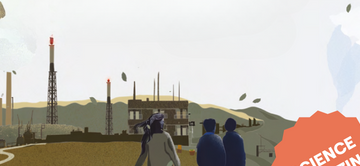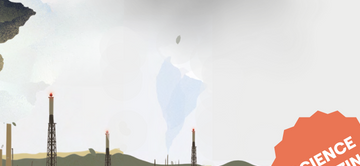This article was published in TSE science magazine, TSE Mag. It is part of the Spring 2024 issue, dedicated to “Climate Revolution”. Discover the full PDF here and email us for a printed copy or your feedback on the mag, there.
Global warming hits poorer countries hardest. But just as pollution ignores national borders, so do the escalating impacts of climate change. Evoking the Pentagon’s description of its role as a ‘threat multiplier’, TSE’s Anouch Missirian finds that the impacts of weather fluctuations in agricultural areas are likely to spill over into developed countries by drastically increasing the flow of asylum-seekers.
Analyzing weather records in 103 low-income countries that send asylum seekers to Europe, Anouch and her coauthor Wolfram Schlenker found that migration increased when temperatures became colder or hotter than the moderate 20°C suitable for growing staple crops. This increase was nonlinear, which means that migration flows accelerated as temperatures became more extreme.
Anouch’s findings of the global scale of distress-driven migration add to a 2015 study showing that unrest in Syria was preceded by a record drought that forced farmers to migrate to urban areas. Although the authors do not attribute the Syrian conflict to the drought, they argue it added another stressor, worsened by political ineptitude or retribution.
COLLECTIVE RESPONSE
When presenting this research, Anouch often recounts the “year without a summer”, when a volcanic eruption in 1815 darkened the skies and reduced global temperatures. Major crop losses followed and drew many peasants out of their farms in Europe and beyond; social unrest and famines completed the dire picture. Then and now, feeding the world is a climate-sensitive business, how will we cope when the planet heats up even further?
Today’s climate migration will likely be dwarfed by future flows. However, much depends on our collective response. If the world fails to reduce carbon emissions, Anouch predicts that all else kept equal, asylum applications to the EU could rise by 188%, with an extra 660,000 migrants every year. If instead we can successfully clamp down on climate polluters, the increase in applications would be a far more moderate 28%.
The “all else kept equal” is important: it’s up to us to ensure that all else is not kept equal, and in particular, that we help the most vulnerable farming communities: using crops and techniques that will withstand the changes to come, or providing new jobs and homes in ways that preserve farmers’ dignity.
FURTHER READING
- Anouch Missirian and Woldfram Schlenker (2017) - Asylum applications respond to temperature fluctuations – Science
- Kelley, C. P., Mohtadi, S., Cane, M. A., Seager, R., & Kushnir, Y. (2015) - Climate change in the Fertile Crescent and implications of the recent Syrian drought - PNAS




